


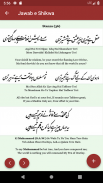
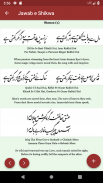
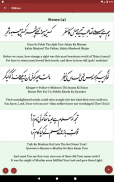
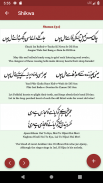
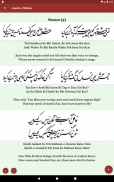
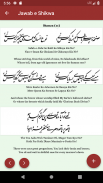

Shikwa Jawab e Shikwa
With English Translation

وصف لـShikwa Jawab e Shikwa: With English Translation
Shikwa (Urdu: شکوہ) and Jawab-e-Shikwa (Urdu: جواب شکوہ) are poems written by well known Urdu language poet Muhammad Iqbal, which were later published in his book Kulliat-e-Iqbal. "Shikwa" is an Urdu word which translates to "complaint" in English.
Shikwa (1909) and Jawab-i-Shikwa (1913) extol the legacy of Islam and its civilising role in history, bemoan the fate of Muslims everywhere, and squarely confront the dilemmas of Islam in modern times. Shikwa is thus, in the form of a complaint to Allah for having let down the Muslims and Jawab-i-Shikwa is Allah's reply.
When the first part of these poems, Shikwa (1909), was published it created a big confusion amongst Muslim scholars who thought that Iqbal is being rude and harsh in his words when talking to God in his book and being unthankfull of the blessings of God since the second part of his poem (Jawab-e-Shikwa) was not announced with Publication of the first one. But later when Jawab-e-Shikwa (1913) was published all the problems went away and everyone praised Iqbal for his contribution to Urdu Poetry and making a difference in Islamic literature.
Shikwa (الأردية: شکوہ) وJawab-E-Shikwa (الأردية: جواب شکوہ) هي قصيدة كتبها الشاعر المعروف باللغة الاوردية محمد إقبال، التي نشرت لاحقا في كتابه Kulliat-E-إقبال. "Shikwa" هي كلمة الأوردو والذي يترجم إلى "الشكوى" في اللغة الإنجليزية.
Shikwa (1909) وJawab-I-Shikwa (1913) تمجيد تراث الإسلام ودوره الحضاري في التاريخ، نتحسر على مصير المسلمين في كل مكان، وبشكل مباشر مواجهة المعضلات الإسلام في العصر الحديث. Shikwa وبالتالي، في شكل شكوى إلى الله لأنه خذل المسلمين وJawab-I-Shikwa هو الرد الله.
عند الجزء الأول من هذه القصائد، Shikwa (1909)، ونشرت خلقت البلبلة الكبيرة بين العلماء مسلم الذين اعتقدوا أن إقبال يجري فظ وقاس في كلماته عندما يتحدث الى الله في كتابه ويجري unthankfull من بركات الله منذ لم يعلن عنها في الجزء الثاني من قصيدته (Jawab-E-Shikwa) مع نشر أول واحد. ولكن في وقت لاحق عندما نشرت Jawab-E-Shikwa (1913) ذهب كل المشاكل بعيدا وأشاد الجميع إقبال لمساهمته في الأوردو الشعر وإحداث فرق في الأدب الإسلامي.

























